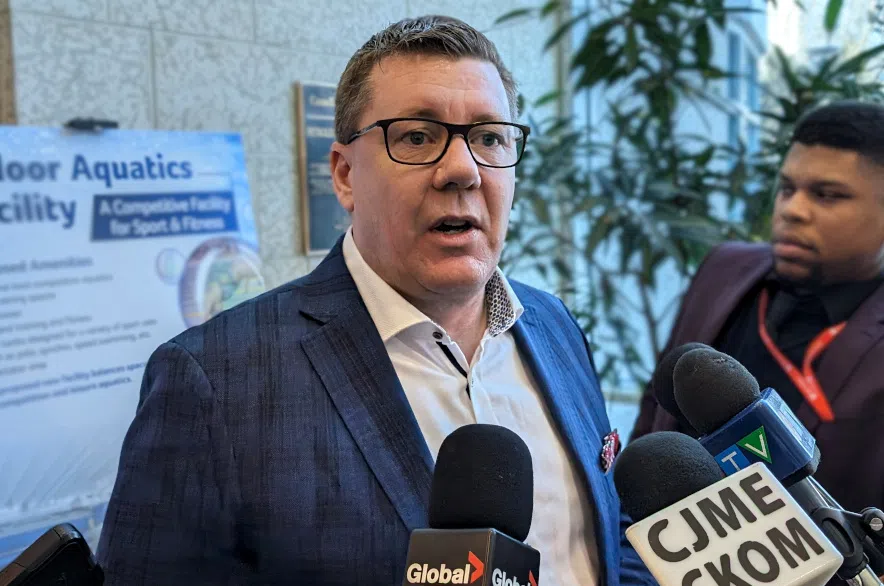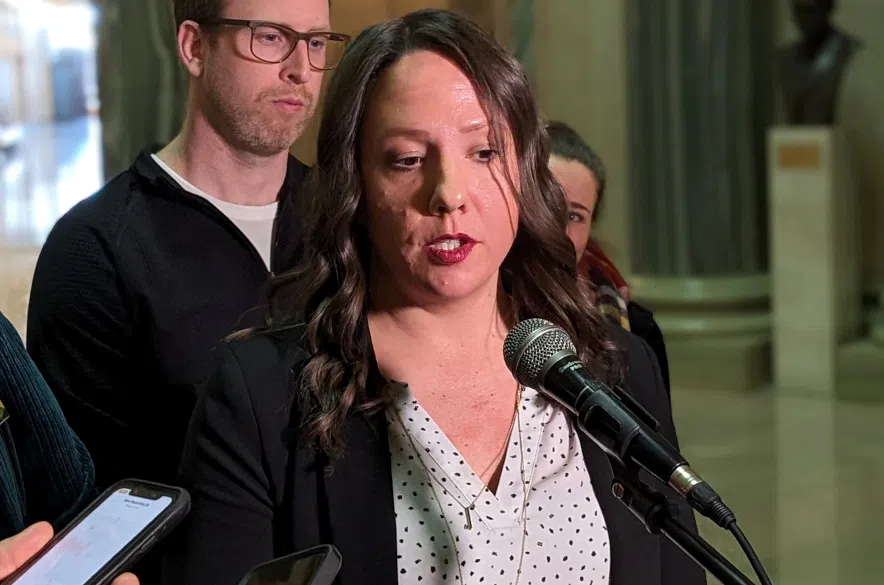Millions more in education dollars still aren’t getting the province’s teachers back to the table in their contract dispute with the Government of Saskatchewan.
On Wednesday evening, Premier Scott Moe posted a video to social media outlining new money that will be in the education budget, to be released in two weeks, to deal with classroom supports. He ended up by asking the Saskatchewan Teachers’ Federation to pause its job action and for teachers and students to return to the classroom.
However, STF president Samantha Becotte and the union are sticking to their guns, saying they won’t be going back to the table until the government is ready to discuss measures around classroom size and complexity within the teachers’ contract.
Becotte said Thursday there’s a need for a long-term commitment where there’s accountability and no exit clause. She said teachers don’t trust that money in the budget this spring would still be there in years to come.
“We have no doubt that after an election, this government would walk that money back or walk some of that money back and do the exact same thing that we saw in the past,” said Becotte.
Saskatchewan Teachers’ Federation president Samantha Becotte says that because the government won’t put classroom size and complexity into the teachers’ contract, she doesn’t believe it intends to keep classroom support funding where it is. (Lisa Schick/980 CJME)
She said they’ve seen budgets touted as record investments which didn’t meet enrolment growth or inflation, they saw the removal of funding from education in 2017, and they’ve seen instances where the teachers’ contract wasn’t fully funded in a budget increase.
“Teachers still remember those things, and this government needs to start working to build trust with teachers again and that would go a long way, to put (classroom size and complexity) in the agreement,” she explained.
Becotte believes there are a lot of ways classroom size and complexity could be addressed in the teachers’ contract, but the unwillingness of the government to acknowledge that it could or should be in the agreement leads her to believe the government has no intention of continuing the funding it has promised in the upcoming budget.
Moe believes his track record and the government’s under his premiership have illustrated how important classrooms are to them.
“This is a government that is focused on investing in our students, investing in our children, and investing in our teachers and the entire education sector,” Moe said Thursday, answering questions for the first time since he posted the video.
“The track record of this government, when it comes to education funding, is pretty solid.”
Moe committed to not reducing education funding from what it will be in the coming budget.
“That is not going to decrease as long as we are the government; that is the budget this year,” he said. “I can’t tell you what is going to be in the budget next year — there’s a lot of things that will happen — but if the Saskatchewan Party is the government next year, that number is not going to decrease.”
The premier appears to feel that a budget should be enough of a promise that the money will be there for classrooms, calling it the “ultimate” document on how government invests tax dollars.
“This is the provincial budget,” Moe said. “There is no more certain agreement that governments have with their voters – whether it be investments in health care (or) whether it be investments in education.”
Moe said the government and teachers agree that complexity in the classroom needs to be addressed; the only difference is in how they do that.
Moe also doubled down on not wanting to include class size and complexity in the teachers’ contracts, saying the place for something like that is in the budget. He said decisions on such things are up to the school divisions and his government is not going to take that away.
Becotte repeated her assertion that the only way for there to be guarantees about the funding is in the contract.
One of the reasons the premier put out his funding announcement and video was to try to get teachers back to the bargaining table.
“We want the STF to do the right thing, to commit to leaving our teachers in the classroom where they belong with our students, making that opportunity to have access to our classrooms for our students, as well as extracurricular, and you come back to the bargaining table and stay there until we can find an agreement,” said Moe.
However, the STF says it won’t stop its sanctions and it won’t go back to the table unless class size and complexity are on the agenda.
When asked why not go back to the table and negotiate all the other issues involved besides classroom size and complexity, Becotte said she doesn’t see the point in doing that when that piece is still outstanding.
NDP Leader Carla Beck said she understands why teachers want to see that topic in their contract because there’s no trust in this government.
“The dollar amount almost is secondary to the fact the no one trusts their numbers (and) no one trusts that they’re going to do what they say they’re going to do in education,” said Beck.
“No one believes the premier’s numbers (and) no one believes (Education Minister Jeremy Cockrill’s) numbers.”
The NDP has previously said that, if it was to form government, it would negotiate on class size and complexity.
Earlier Thursday, the government announced it had approved another 15 teacher-led projects for funding through the Teacher Innovation and Support Fund. The projects received funding totaling $452,206.
The government launched the program in January to address classroom issues.












